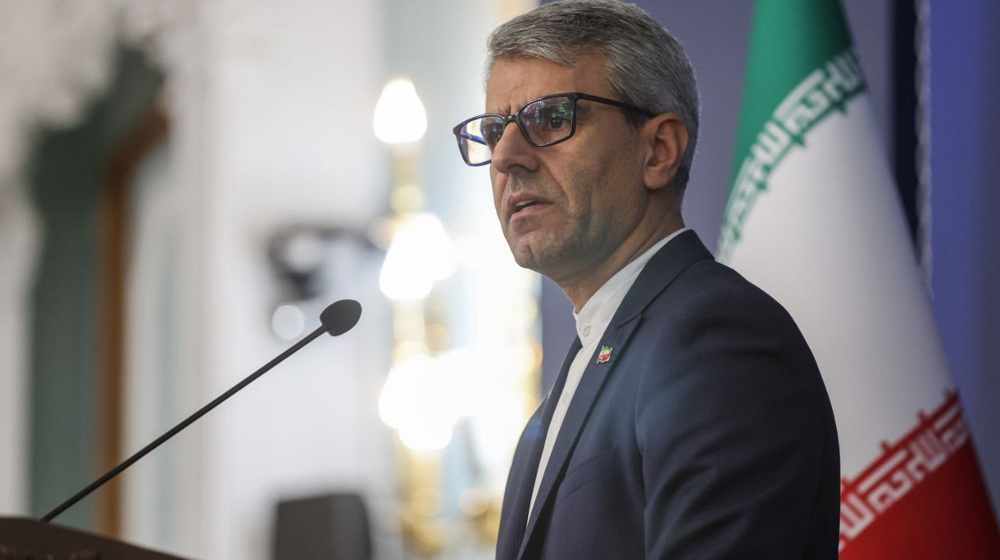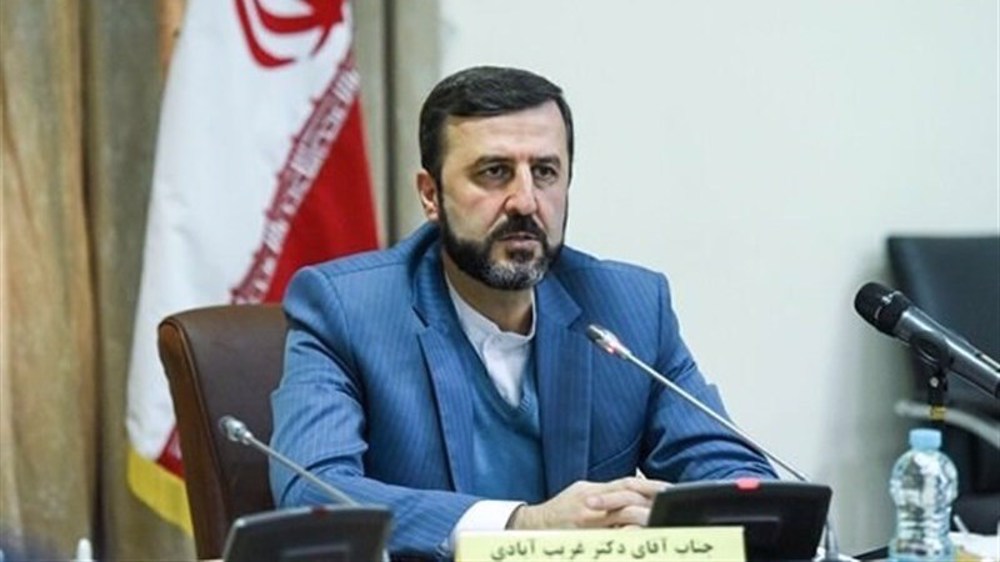Iran's negotiator: Outstanding issues in JCPOA talks need serious decisions in respective capitals
Iran’s top negotiator in the Vienna talks on the revival of the 2015 nuclear agreement signed between Tehran and major powers says outstanding issues pertaining to the deal’s revitalization still remain, whose resolution calls for “serious” decisions to be made in the respective capitals of participating countries.
Speaking to reporters in the Austrian capital on Sunday at the end of the sixth round of talks between Iran and the remaining signatories to the Joint Comprehensive Plan of Action (JCPOA), Abbas Araqchi said the sides had managed to make progress, especially on the draft text of the conclusion of their talks.
Araqchi, who is also Iran’s deputy foreign minister for political affairs, called on the involved parties to make the necessary decisions with “seriousness and strong will” in order to help revive the nuclear deal.
The sides, he said, are now closer to an agreement than any time before.
“The agreement could be reached in the next round of negotiations although it cannot be guaranteed.”
Iran, P4+1 reach good understanding, closer to deal: Araqchi tells Press TV
The Iranian official also talked to Press TV's correspondent in Vienna at the end of the JCPOA Joint Commission talks, saying that Iran and the P4+1 group of countries have reached good understanding of what the deal looks like and have made good progress on technical details.
“Documents are almost ready; if there are still differences on the documents, there are very clear-cut differences that would ease the process of decision-making in the capitals,” the senior Iranian diplomat said.
“But again we have a very good picture of those differences, those key issues, and that would help decision-makers in all relevant countries.”
Araqchi once again reiterated that Iran and five other parties to the nuclear deal “are closer to a deal than any time in the past, but it doesn’t mean that we are there.”
The remaining job, Araqchi said, is “still difficult and needs lots of efforts and further talks. So we decided to cut negotiations here, go back home, not only for consultation, but this time for decision-making.”
Representatives of Iran and Britain, France, Germany, Russia and China have been engaged in the Vienna process since early April with the purpose of finding ways to bring the United States back to the deal and prepare the ground for its full implementation.
A US delegation is also in the Austrian capital, but it is not attending the discussions directly because the United States is not a party to the accord any longer.
On behalf of EU High Representative Josep Borrell, the meetings are chaired by Deputy Secretary General and Political Director of the European External Action Service Enrique Mora.
Former US President Donald Trump abandoned the deal and reimposed the anti-Iran sanctions that the JCPOA had lifted. He also placed additional sanctions on Iran under other pretexts not related to the nuclear case as part of the “maximum pressure” campaign.
Now, the new US administration says it wants to compensate for Trump’s mistake and rejoin the deal, but it is apparently seeking to maintain some of the sanctions as a tool of pressure.
Tehran insists that all the sanctions should first be removed in a verifiable manner before the Islamic Republic reverses its remedial measures.
Negotiating sides decided to adjourn talks for consultations: Top Russian negotiator
In a tweet on Sunday, the Russian ambassador to international organizations in Vienna, Mikhail Ulyanov, said participants at the sixth meeting of the JCPOA Joint Commission decided to adjourn the talks for consultations “in preparation for what is supposed to be the final round of negotiations.”
The JC of #JCPOA met today, took stock of the significant progress made at the #ViennaTalks,including at the sixth round, and decided to make a break to allow participants to consult with their capitals in preparation for what is supposed to be the final round of negotiations.
— Mikhail Ulyanov (@Amb_Ulyanov) June 20, 2021
“The JC of #JCPOA met today, took stock of the significant progress made at the #ViennaTalks,including at the sixth round, and decided to make a break to allow participants to consult with their capitals in preparation for what is supposed to be the final round of negotiations,” Ulyanov, who is the head of the Russian delegation to the Vienna talks, tweeted.
In another tweet, the Russian diplomat responded to a comment on one of his posts and said all the sides in the Vienna talks, including the US, “have a difficult way to go.”
I understand your scepticism. But let me remind you that negotiations on nuclear deal took many years. The #ViennaTalks on #JCPOA restoration last less than 3 months. Besides, no need to single out #Iran in this context. All participants have a difficult way to go, including #US. https://t.co/itHtVtuUeW
— Mikhail Ulyanov (@Amb_Ulyanov) June 20, 2021
“I understand your scepticism. But let me remind you that negotiations on nuclear deal took many years. The #ViennaTalks on #JCPOA restoration last less than 3 months. Besides, no need to single out #Iran in this context. All participants have a difficult way to go, including #US,” Ulyanov said.
He also told reporters that consultations at respective capitals of the remaining JCPOA members aim to prepare the ground for what is supposed to be the final round of negotiations.
Ulyanov, however, noted that "nobody knows when negotiations will resume."
Negotiators ‘closer’ to saving JCPOA but sticking points remain: EU top diplomat
The EU top diplomat to the Vienna talks also told reporters that the negotiators are "closer" to saving the Iran nuclear deal, but sticking points remain.
Enrique Mora added that the sides have made progress in this round of talks and have a clearer idea of what the political problems are.

"My expectation is that delegations will come back with a clearer idea of how to close a deal," the EU representative said.
Mora did not say when the talks would resume, noting that the main problem continued to be to find a solution "in this delicate balance" between lifting the US sanctions on Iran and reversing Tehran's stepped-up nuclear activities.
Mora said the next round would also give "a clearer idea" of Iran's "new political environment" though he pointed out that talks had carried on despite the presidential election in the country.
He also emphasized that Iran and the International Atomic Energy Agency (IAEA) are expected to reach an agreement on extending monitoring deal.
Jan. 12, 2026 – the day Iranians again rallied to reject hostile plots against Islamic Republic
IRGC intelligence dismantles MKO, monarchist terror cells in NE Iran
‘Permits of humiliation’: Israel targets Christian schools in al-Quds
Over 470 terrorists, riot ringleaders captured across Iran
UNRWA chief warns about 'record highs' of diseases in Gaza amid Israeli siege
Israeli agricultural exports face looming 'collapse' amid boycotts over Gaza genocide
VIDEO | Canadians preparing to hold more rallies in solidarity with Venezuela
VIDEO | Iranian national Mahdieh Esfandiari goes on trial for supporting Palestine










 This makes it easy to access the Press TV website
This makes it easy to access the Press TV website